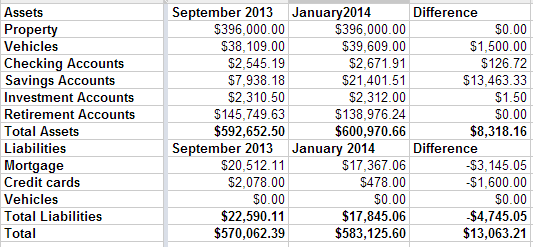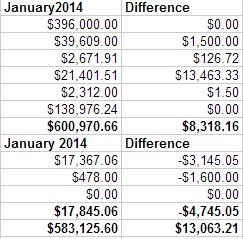- RT @MoneyMatters: Frugal teen buys house with 4-H winnings http://bit.ly/amVvkV #
- RT @MoneyNing: What You Need to Know About CSAs Before Joining: Getting the freshest produce available … http://bit.ly/dezbxu #
- RT @freefrombroke: Latest Money Hackers Carnival! http://bit.ly/davj5w #
- Geez. Kid just screamed like she'd been burned. She saw a woodtick. #
- "I can't sit on the couch. Ticks will come!" #
- RT @chrisguillebeau: U.S. Constitution: 4,543 words. Facebook's privacy policy: 5,830: http://nyti.ms/aphEW9 #
- RT @punchdebt: Why is it “okay” to be broke, but taboo to be rich? http://bit.ly/csJJaR #
- RT @ericabiz: New on erica.biz: How to Reach Executives at Large Corporations: Skip crappy "tech support"…read this: http://www.erica.biz/ #
Anchor Price Your Salary
- Image by Dalboz17 via Flickr
Conventional wisdom says that, when negotiating your salary or a raise, you should make whatever crazy ninja maneuvers it takes to get the other person to name a number first.
Horse pellets.
Have you ever watched an infomercial? Those masters of of impulse marketing geared towards insomniacs, invalids, and inebriates?
“How much would you pay for this fabulous meat tenderizer/eyelash waxer? $399? $299? No! If you call within the next 73 seconds, we will let you take this home for the low, low price of just $99.99!”
That’s the magic of anchor pricing.
The first number you hear is the number you will base all further numbers on. If you hear a high number, other lower numbers will feel much lower by comparison. The number doesn’t even have to be about money.
There was a study done that had the subjects compare a price to the last two digits of their social security numbers. Those with higher digits found higher prices to be acceptable, while those with lower prices only accepted cheaper prices.
What does an infomercial marketing ploy have to do with your salary?
If you are negotiating your salary and your potential employer gives a lowball offer, every higher counteroffer after that will much, much higher than than it would otherwise. On the other hand, if you start with your “perfect” salary, they amount you will be happy to settle for won’t seem to be nearly as high to the employer. At the same time, you will be less likely to accept a lowball offer if you set your anchor price high.
For example, if you are looking to make $50,000:
The employer offers you $40,000. $60,000 seems too high by comparison, so you counter with $50,000, then compromise and settler for $45,000. Or, you could start at $60,000, making the employer feel that $40,000 is too low, so he counters with $45,000, leaving a compromise at $52,000. That’s a hypothetical $7,000 boost, just for bucking conventional wisdom and taking a cue from the marketing industry.
How have you negotiated your salary?
How to Prioritize Your Spending
Don’t buy that.
At least take a few moments to decide if it’s really worth buying.
Too often, people go on auto-pilot and buy whatever catches their attention for a few moments. The end-caps at the store? Oh, boy, that’s impossible to resist. Everybody needs a 1000 pack of ShamWow’s, right? Who could live without a extra pair of kevlar boxer shorts?
Before you put the new tchotke in your cart, ask yourself some questions to see if it’s worth getting.
1. Is it a need or a want? Is this something you could live without? Some things are necessary. Soap, shampoo, and food are essentials. You have to buy those. Other things, like movies, most of the clothes people buy, or electronic gadgets are almost always optional. If you don’t need it, it may be a good idea to leave it in the store.
2. Does it serve a purpose? I bought a vase once that I thought was pretty and could hold candy or something, but it’s done nothing but collect dust in the meantime. It’s purpose is nothing more than hiding part of a flat surface. Useless.
3. Will you actually use it? A few years ago, my wife an cleaned out her mother’s house. She’s a hoarder. We found at least 50 shopping bags full of clothes with the tags still attached. I know, you’re thinking that you’d never do that, because you’re not a hoarder, but people do it all the time. Have you ever bought a book that you haven’t gotten around to reading, or a movie that went on the shelf, still wrapped in plastic? Do you own a treadmill that’s only being used to hang clothes, or a home liposuction machine that is not being used to make soap?
3. Is it a fad? Beanie babies, iPads, BetaMax, and bike helmets. All garbage that takes the world by storm for a few years then fades, leaving the distributors rich and the customers embarrassed.
4. Is it something you’re considering just to keep up with the Joneses? If you’re only buying it to compete with your neighbors, don’t buy it. You don’t need a Lexus, a Rolex, or that replacement kidney. Just put it back on the shelf and go home with your money. Chances are, your neighbors are only buying stuff so they can compete with you. It’s a vicious cycle. Break it.
5. Do you really, really want it? Sometimes, no matter how worthless something might be, whether it’s a fad, or a dust-collecting knick-knack, or an outfit you’ll never wear, you just want it more than you want your next breath of air. That’s ok. A bit disturbing, but ok. If you are meeting all of your other needs, it’s fine to indulge yourself on occasion.
How do you prioritize spending if you’re thinking about buying something questionable?
Time Management
My wife told me that I don’t do enough around the house.
She is, of course, correct.
I could make a list of excuses, but none of them matter. There’s really only one reason: I have problems with time management. I’m easily distracted.
For example, in the time it’s taken me to write the above three lines, I stopped to check a website, updated my Evernote installation, and added a new contact to my address book.
That’s not multi-tasking, that’s inefficiency. People don’t actually multi-task. Instead, they break concentration and completely switch gears. Repeatedly. They pretend they are doing a lot of things at once, when in fact they are doing a large series of individual tasks. That’s serial single-tasking, poorly.
On top of that, I focus to the point of obsession. The entire world goes away when I am working.
No, that’s not a contradiction. I’m good at procrastinating and I am interested in everything. If a random thought floats to the surface while I’m working, I follow it to Google and, if it’s interesting enough, I get lost. It generally only happens during research or while doing a job I hate.
For those of you following along at home, I can be easily distracted from some tasks, then lock on to some tangent and have an evening disappear.
For some reason, my wife hates that, especially when there are dishes to be done and laundry to be folded.
This has blown up on me a few time.
We’ve come upon a solution, in three parts.
1. Timer. When I get on the computer, I set an egg timer for 1 hour. When the time’s up, I’m done. The time limit helps me focus on finishing the task at hand. If I know I need to get a post written in an hour, I’m less likely to catch up on the comics in my news reader.
2. Communication. If I’m working on something that I know will take more than an hour, I tell her. I’ve had to do that for each installment of the Make Extra Money series.
3. Nagging. If #1 has failed and #2 doesn’t apply, I’ve given my wife explicit permission to remind me, as often as necessary. Sometimes, I don’t register everything people say when I am “lost”, so now she knows to keep trying if I don’t respond, or respond with a spaced-out “Uh-huh, yes, dear.” Before, she was worried about upsetting me by nagging, but I wouldn’t have noticed the first few times. Thankfully, with #1 and #2, #3 has only been an issue one.
Time limits, communication, and persistent reminders. That’s my plan to manage my time. Getting off of the computer has helped me be more useful with household chores and it’s given me a chance to be closer to the woman I love most. The time-limited focus has even helped me get a couple of projects rolling.
We all have the same 24 hours. Are you using yours efficiently?
(P.S. Happy anniversary, honey. These have been the best years I could ask for.)
Mortgage Race, Part 2
As I mentioned last month, Crystal and I are in a race to pay off our mortgages. The loser(henceforth known as “Crystal”) has to visit the winner. Now, since–judging by the temperature–Crystal lives in Hell, I think it would be good for her to visit in the winter. There something about the idea of going ice fishing, staring at a hole in the ice while sitting on a 5 gallon bucket, cursing the day I was born.
Today, she threw down the gauntlet again. She has apparently decided that, since her prerequisites are met, she’s going to win. Sure, she’s closed on her house and built her savings back up to $20000, but it doesn’t matter. I’ve sent a small army of arson-ninjas to keep her from getting ahead. They are so small, they can only carry tiny matches and single drops of gasoline, so the damage they can do is tiny, but it will add up. Just a word of advice: if you hire an army of arson-ninjas, go for the upsell and get ninjas that are at least 2 feet tall. Anything less is just inefficient.
When I announced the race last month, my mortgage balance was $26,266.40. Today, it is $25,382.53. In three days, there will be another $880 applied to the principal.
In February, our renters will move in and we’ll conservatively have another $650 to pay. When that starts, our balance should be around $23,000. Adding a portion of the rent payment should mean we pay off the house in May 2014. However, when I bring in our side hustle money, that will bring us back to September 2013.
Crystal’s projected payoff is July 2013, so I’ll have to hustle.
Net Worth Update – January 2014
This may be the most boring type of post I write, but it’s important to me to track my net worth so I can see my progress. We are sliding smoothly from debt payoff mode to wealth building mode.
Our highlights right now are nothing to speak of. We did let our credit card grow a little bit over the last couple of months, but paid it off completely at the end of December. It grew mostly as a matter of not paying attention while we were doing our holiday shopping and dealing with some car repairs.
That’s it. We haven’t remodeled our bathrooms yet, but we have the money sitting in a savings account, waiting for the contractor. We haven’t bought a pony yet, but we did decide that a hobby farm wouldn’t be the right move for us. We’ll be boarding the pony instead of moving, at least for the foreseeable future.
Our net worth is up $13,000 since September. Our savings are up and our retirement accounts are down because there are two inherited IRAs that we need to slowly cash out and convert to regular IRAs.






